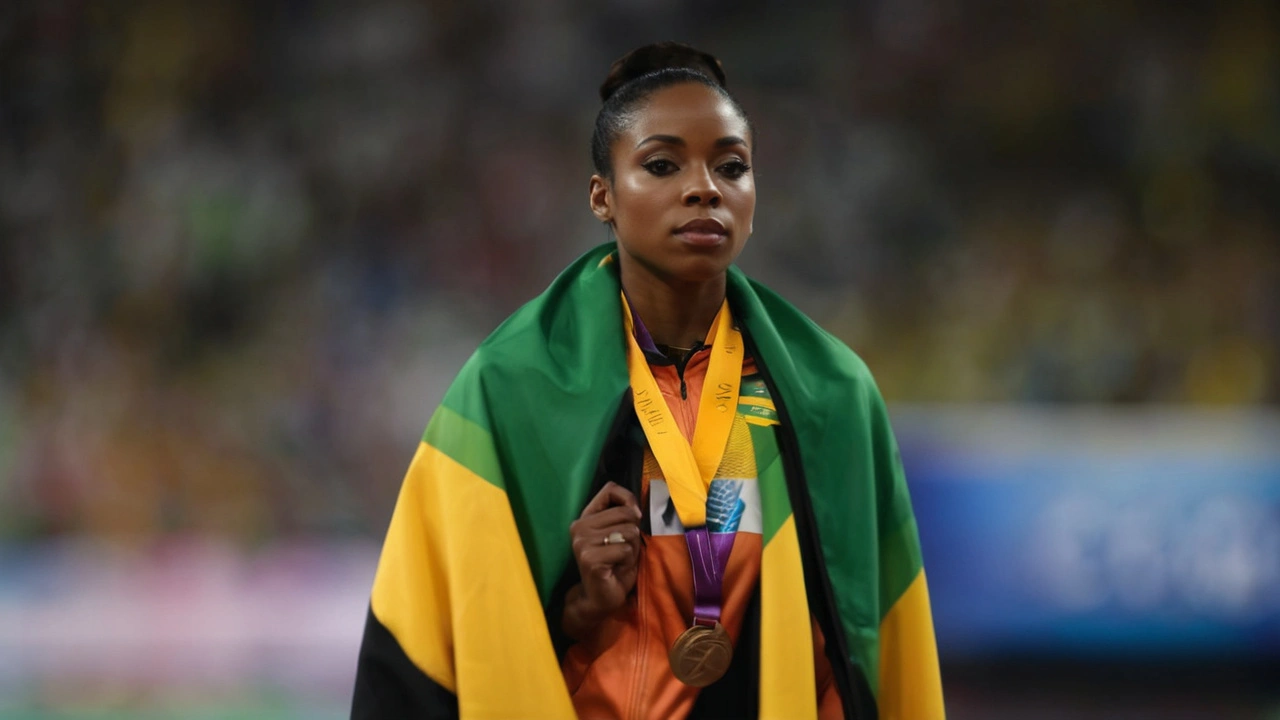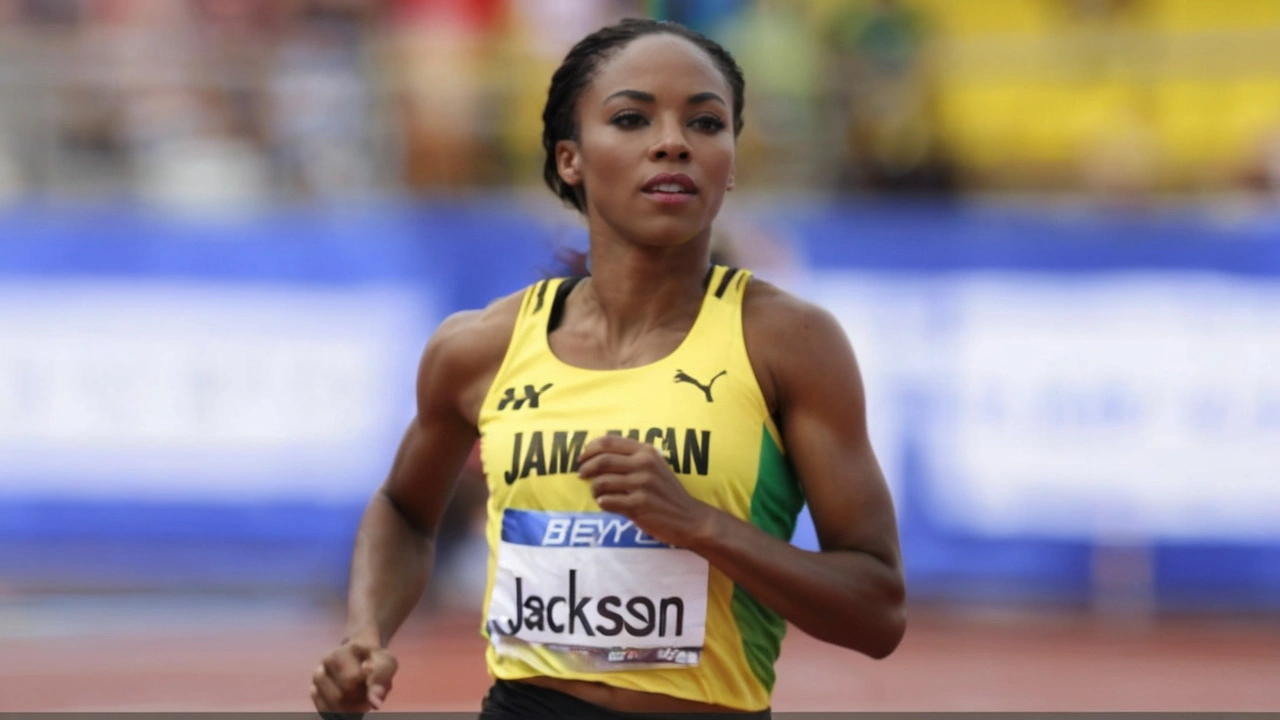Shericka Jackson Withdraws from Women's 200m Final at Paris 2024 Olympics
In a sudden turn of events, Jamaican sprinter Shericka Jackson has withdrawn from the women's 200m final at the Paris 2024 Olympics citing an injury. Known for her dominance in the 200m event where she is a two-time world champion, Jackson's unexpected exit has sent ripples through the athletics community. This decision comes after she had earlier pulled out from the women's 100m competition to focus on her preferred distance of 200m, only now to make an even more surprising decision to not compete at all.
For those who have closely followed her career, the news of her withdrawal is both shocking and concerning. Jackson has been a beacon for Jamaican sprinting, often standing shoulder to shoulder with legends such as Shelly-Ann Fraser-Pryce and Elaine Thompson-Herah. Her consistency, speed, and strategic race planning have made her one of the most formidable competitors on the track.
Challenges for Jamaican Sprinters
Jackson's decision to withdraw is not an isolated incident for Jamaican sprinters in these Olympics. The nation, known for its sprinting prowess, has faced multiple setbacks in Paris. Notably, fellow standout Shelly-Ann Fraser-Pryce had to withdraw from the 100m semi-final after a disagreement over a recent rule change. Meanwhile, Elaine Thompson-Herah, another star in the Jamaican sprinting galaxy, announced her withdrawal last month due to an Achilles problem.
These incidents collectively paint a challenging picture for a nation so deeply invested in track and field success. It raises questions about the pressures faced by these athletes and the physical and emotional toll of competing at the highest levels. The Olympic podium, long dominated by Jamaican athletes, now looks more open than ever, offering new opportunities and shifting the competitive landscape.
Impact on the Women's 200m Event
The absence of Shericka Jackson alters the dynamics of the women's 200m final significantly. With her out of the race, the spotlight shifts to other top contenders poised to seize the moment. Among them is American sprinter Gabby Thomas, who now sees her chances of clinching a gold medal substantially increase. Thomas has already proven her mettle, with impressive performances leading up to the Olympics, making her one of the favorites in the absence of Jackson.
The reshuffling of the field could lead to a more unpredictable and exhilarating race, potentially introducing new stars to the global stage of athletics. This injection of fresh talent, while exciting, also underscores the precarious nature of professional sports where unforeseen circumstances can dramatically change the outcome of highly anticipated events.
Looking Ahead
For Shericka Jackson, the decision to withdraw undoubtedly comes after much consideration and likely stems from a perspective of long-term health and career sustainability. Injuries are an inevitable part of an athlete's journey, but how they manage these setbacks often defines their careers. Jackson will likely focus on recovery and preparation for future events, aiming to return stronger and more resilient.
As the Paris 2024 Olympics continue, fans and athletes alike will keenly watch how the remaining races unfold, and how the absence of Jackson and other Jamaican sprinters influences the outcomes. These developments add a layer of intrigue and uncertainty, reflective of the ever-evolving landscape of competitive sports.

Conclusion
Shericka Jackson's withdrawal from the women's 200m final is a significant moment in the narrative of the Paris 2024 Olympics. It highlights not only the fragility of athletic careers but also the enduring spirit of competition that drives athletes to overcome obstacles. While her absence will be felt, it opens the door for other runners to step into the limelight, reshaping the race and perhaps heralding the rise of new champions.
The ever-changing dynamics of sports ensure that each event carries its own story, filled with triumphs, challenges, and the unyielding pursuit of excellence. Shericka Jackson's journey, marked by resilience and determination, continues to inspire, even as she steps back to heal and prepare for future victories.

James Lawyer
August 4, 2024 AT 20:50The abrupt withdrawal of Shericka Jackson from the 200 m final reshapes the competitive landscape of the Paris Games.
From a performance analysis perspective, her absence removes a statistically superior split time from the field.
Historical data indicates that Jackson consistently posted sub‑22-second performances, which would have placed her among the top three contenders.
Without her, the distribution of medal probabilities shifts noticeably toward athletes who previously occupied secondary positions.
This development also affects the strategic pacing of the remaining sprinters, who may now adopt a more aggressive early‑phase approach.
Coaches are likely to recalibrate their race plans to exploit the void left by Jackson's proven acceleration in the curve.
Moreover, the psychological impact on rivals cannot be understated, as the perceived dominance of Jamaican sprinting has been a motivating factor for many competitors.
The withdrawal underscores the fragility of athletic preparation at the elite level, where injury can nullify months of training in an instant.
It also prompts a broader discussion about the load management protocols employed by national teams during multi‑event championships.
The Jamaican federation may need to reassess its approach to athlete monitoring to mitigate similar setbacks in future competitions.
In parallel, the United States squad now finds itself with an enhanced pathway to the podium, particularly for athletes like Gabby Thomas.
Thomas’s recent season bests suggest she possesses the requisite speed endurance to capitalize on the altered field composition.
Fans and analysts alike will be watching closely to see whether this opportunity translates into a medal performance.
The narrative of the women's 200 m will likely evolve to highlight resilience and adaptability among the remaining competitors.
Ultimately, while Jackson’s withdrawal is disappointing, it offers a compelling case study in how unforeseen variables can dictate Olympic outcomes.
Abby Culbertson
August 15, 2024 AT 20:43Its sad to see her out, hope she get better soon.
Awolumate Muhammed Abayomi
August 26, 2024 AT 20:37Yo, kids, this is a blunt reminder that injuries can hit anyone, even the fastest on the block.
We gotta keep grinding and push each other, cause tomorrow's race may need a fresh face.
Don't let Jackson's slip make you doubt your hustle; the track is still open for greatness.
Teamwork and support from fellow athletes can turn this setback into a springboard.
Stay sharp, stay healthy, and the medals will find you when the time's right.
Josh Tate
September 6, 2024 AT 20:30I really feel for Shericka-coming in with such high expectations and then having to sit out is rough.
Her health comes first, and it’s wise to prioritize a full recovery over a quick comeback.
Fans will still be cheering for her whenever she’s back on the track.
John Smith
September 17, 2024 AT 20:23Look, the data doesn't lie: Jackson's average split was the fastest among the field, so her absence mathematically boosts everyone's odds.
That’s why you’ll see a spike in projected medal shares for the US and European sprinters.
People act surprised, but it's basic probability.
Alex Soete
September 28, 2024 AT 20:17Alright folks, let's channel that energy into the next races!
With Jackson out, the field is wide open and we can expect some insane finishes.
Keep the hype alive and support the runners-every cheer counts.
Cara McKinzie
October 9, 2024 AT 20:10Well, there goes another Jamaican star, and just like that the whole sprint narrative crumbles.
Honestly, it feels like a soap opera with too many plot twists to keep up.
Seems like the federation’s management is a disaster waiting to happen.
Joseph Conlon
October 20, 2024 AT 20:03While the statistical outlook you present appears tidy, it glosses over the human element that defies pure numbers.
Athletes are not static data points; their mental state, race-day conditions, and tactical choices introduce variables that models often miss.
Furthermore, the notion that everyone automatically benefits from Jackson's withdrawal assumes a homogenous field, which is far from reality.
Some competitors thrive under pressure, while others falter when their expected rivals vanish.
Therefore, the simplistic probability boost you suggest may be an overestimation in practice.
In short, the race dynamics remain complex despite the absence of a single star.
Mohit Singh
October 31, 2024 AT 18:57Enough melodrama – the real issue is poor injury management, not some soap‑opera drama.
Damian Liszkiewicz
November 11, 2024 AT 18:50Great analysis! 🌟 The way you broke down the ripple effects really helps us grasp the bigger picture.
It’s a reminder that every athlete’s health decision reshapes the entire competition.
Let’s keep supporting the remaining runners and stay optimistic for some thrilling finishes. 😊
Angela Arribas
November 22, 2024 AT 18:43It's sad to see her out; hope she gets better soon. :)
Sienna Ficken
December 3, 2024 AT 18:37Oh sure, because a few typos magically turn a serious injury into a motivational poster. Nothing says 'keep grinding' like ignoring the medical reality.